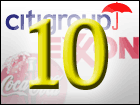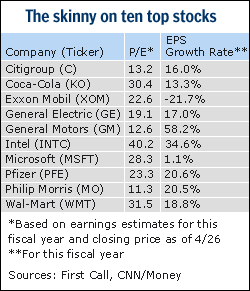
NEW YORK (CNN/Money) -
Last year was easier -- at least then all stocks were getting killed.
But now, some sectors are starting to show signs of strength while others continue to flounder. And though first-quarter earnings season is pretty much over, the outlook for the rest of the year is as confusing as ever.
Nowhere is this more evident than by looking at the following 10 stocks. To try and get a handle on the various parts of the market, we chose 10 corporate titans in a variety of industries that are either one of the 15 largest companies by sales or market capitalization (often both), and also among the most widely-held stocks.
You might not have bought any of these stocks directly, but if you've got an S&P 500 index fund or large cap fund in your portfolio, you likely own them all: Citigroup, Coca-Cola, Exxon Mobil, General Electric, General Motors, Intel, Microsoft, Pfizer, Philip Morris and Wal-Mart. (Click on a company's name to jump to a discussion about that stock.)
Citigroup: Citigroup is the largest financial-services institution in the United States, and it does it all. It has exposure to pretty much every aspect of finance, consumer and commercial banking through its Citibank unit; investment banking and brokerage with Salomon Smith Barney; and insurance through the recently spun-off Travelers (TAP.A: Research, Estimates).
Many financial services companies were hit hard last year and in the first quarter this year as the sluggish economy, bad loans to big corporate flameouts like Enron and international woes hurt earnings. Citi is a perfect example of that. In the fourth quarter of 2001, Citi was forced to take a writedown related to Enron. There was also a slight wrinkle in the company's first quarter earnings report -- profits were slightly lower than expected due to an Argentina-related write-down.
But overall, Citi is still clicking. Despite the big writedown, most divisions turned in healthy growth (see more on the bright side to Citi's earnings), and earnings are expected to increase 16 percent this year and the stock trades at just 13 times earnings.
Coca-Cola: Coke is it! That slogan is a little old, dating back to the early 1980's, but the world's largest beverage producer does indeed seem to be back on track. After several years of poor performance, Coke is one of the top stocks in the Dow so far this year, up 16 percent.
Investors were encouraged by Coke's report that unit case volume was up 5 percent in the first quarter of this year, compared to an increase of 4 percent in 2001. The North American market especially has seemed to rediscover Coke. Last year, unit case volume increased just 1 percent in the first quarter. This year, it was up 5 percent. Earnings are expected to increase 12.6 percent for the year but one negative is that the stock's valuation may be too bubbly, at 30 times estimates.
Exxon Mobil: ExxonMobil, the world's largest refiner of petroleum, missed Wall Street's consensus first quarter earnings estimate by 23 percent. A combination of lower oil prices in the first quarter of this year compared to last year and a loss in the refining portion of Exxon Mobil's business led to the shortfall.
If oil prices remain where they are now, hovering around $26 a barrel, that could bode well for the stock. But even though oil prices have risen in the second quarter due to tensions in the Middle East, analysts still trimmed their earnings forecast for the year following Exxon's miss. The First Call consensus estimate for 2002 is now $1.77 a share, compared to $1.82 a week ago. That's 21.7 percent lower than last year's earnings.
General Electric: It's not easy living under the shadow of Jack Welch. New GE CEO Jeffrey Immelt is facing an investing public that is far more skeptical in the wake of the Enron disaster. Shares of GE are down 21 percent year-to-date as Wall Street has questioned the company's complex financial structure.
GE is about as close to a proxy for the economy as you can get, with businesses ranging from financial services and television to medical supplies, jet engines and household appliances. And GE has stuck to a forecast of double-digit earnings growth this year.
The company said during its first quarter conference call that there were signs of improvement in its NBC network television unit. And though revenues at GE's massive GE Capital finance unit declined in the first quarter, earnings increased 18 percent. The fundamentals for that business should improve with a strengthening economy.

General Motors: Bear market? Sluggish economy? Don't tell that to GM investors. The stock is up 34 percent year to date. Stronger-than-expected auto sales in North America in the first quarter helped offset a loss in GM's European operations.
The company has also signaled that the rest of the year should be solid as well. GM raised its earnings target for 2002 to $5 a share, from $3.50. To be sure, incentives such as zero percent financing and $2,002 rebates on new models have helped juice sales, but a strengthening economy has also helped boost demand for GM, particularly for its line of trucks and sports utility vehicles.
Intel: Semiconductors were one of the few bright spots for the technology sector in an otherwise dismal first quarter. Intel, the world's largest manufacturer of chips, was no exception. (For more on the semiconductor outlook, click here.)
Revenues in the first quarter were higher than the same period last year, an encouraging sign since the last time the company reported a year-over-year revenue increase was a year ago. And the company predicted that gross margins for 2002 would be higher than expected. The big question is whether or not this outlook is already priced into the stock. Intel trades at more than 40 times 2002 earnings estimates and the stock is up nearly 50 percent since the market's mid September lows.
Microsoft: Chips may finally be starting to show signs of a rebound but other areas of technology, including software, are still struggling. Microsoft was clearly not immune from the software slowdown. Earnings are only expected to increase slightly in fiscal 2002 (which ends in June) and the company lowered its earnings target for fiscal 2003 as well. Analysts now expect Microsoft to post an earnings increase of just 5.5 percent in 2003.
The company is still involved in a court-room battle with nine states regarding antitrust charges and Microsoft's Xbox game console appears to be not as big a hit as expected. Of course, any sustained uptick in the economy would likely lead to higher demand for Microsoft's software, but the stock may not deserve the premium valuation investors have grown accustomed to, considering the slowing growth prospects. (For more about Microsoft's valuation, click here).
Pfizer: Although pharmaceutical giant Pfizer warned that second-quarter earnings growth would be below analysts' expectations, there's still a lot to like about the stock. Competitors Merck (MRK: Research, Estimates) and Eli Lilly (LLY: Research, Estimates) are both expected to report slight declines in earnings this year but Pfizer's earnings for the full year are expected to increase a healthy 20.6 percent from last year.
Pfizer's outlook got a little brighter last week after AstraZeneca (AZN: Research, Estimates) announced a delay in the U.S. launch of Crestor, a cholesterol-fighting drug. Crestor would compete directly with Pfizer's Lipitor, which is the world's biggest selling drug. Also last week, Pfizer announced it was increasing its dividend payment 18 percent to 13 cents a share. How's that for stability in a tough market?
Philip Morris: The food, beer and tobacco conglomerate is a classic defensive stock play. And with increasing concerns about the extent of the economic recovery, it's no wonder that shares of Philip Morris are up nearly 20 percent this year. Despite this gain, the stock still trades at just 11 times 2002 earnings estimates while earnings are expected to increase by 20 percent.
It should be a interesting transition year for the company however. Philip Morris is said to be close to selling its Miller Brewing unit to South African brewer SAB, leaving the company with its tobacco business and Kraft, its food division. Shareholders concerned about the effects of tobacco litigation can buy shares in Kraft (KFT: Research, Estimates), which Philip Morris spun off a portion of last year. And shareholders recently approved a corporate name change for Philip Morris. The new name, which should take effect by the end of the year, will be Altria.
Wal-Mart: As long as consumers keep on spending, Wal-Mart will be in good shape. The discount store chain has benefited not only from the continued resilience of the consumer but also from a desire to spend less. Department stores, for example, did not fare nearly as well during the latest economic downturn as Wal-Mart.
Wal-Mart is the only company in this roundup that has yet to report its first-quarter earnings. (It will do so in mid-May.) On Monday, the company reiterated that same-store sales (stores open for at least a year) in the first quarter should be 5 to 7 percent higher than a year ago. Analysts expect total sales to be up 13 percent from the same quarter last year and are predicting a 16 percent increase in earnings.
Nonetheless, investors will want to keep an eye on Wal-Mart's expansion plans. The company is considering getting into the used-car business. There has been some concern about whether new store formats will be successful enough for Wal-Mart to spur further earnings growth. But so far, everytime the company has entered a new retail format, it has quickly become one of the market leaders.

|

